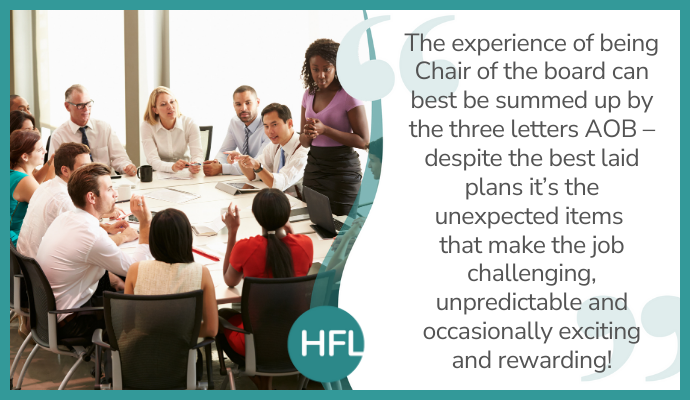
I am sure as Chairs, and governors, we have all been sat at a meeting that has gone to plan, no items have overrun, some great questions have been asked, the biscuits weren’t stale and the tea tasted almost like tea, then you arrive at the final item, AOB. The Chair politely enquires if anyone has anything they would like to raise, there’s a shuffling of papers, laptops are closed, chairs shuffle, coats are readied and then after a pause that’s just long enough to indicate that it’s time to pack up someone declares they have a few things they would like to raise – not for them to send their questions in advance or to declare them at the head of the meeting, just a series of curve balls that, with energy levels low and patience even lower, have to be given the respect and time to respond to and hopefully resolve! I say all this by way of illustration of the life of being a Chair – I remember the days before email when if you finished work without a call from your headteacher you could go home in the knowledge that all was well at your school. Now a Chair has little escape from being contacted by phone, email or social media at all hours of the day and so has little respite from the feeling of being ‘on call’ – even Ofsted are happy to call a Chair whilst they are on holiday to get their input into the school’s inspection! I will admit a few years ago I took my Ofsted crib sheet on holiday with me ‘just in case’ – not something I admitted to my family at the time!
If someone asks me what the day to day work of a Chair is my general response is how long have you got! In my opinion it boils down to the arts though – the art of diplomacy, the art of being inclusive and respecting many viewpoints, the art of chairing a meeting, the art of compassion, compromise, empathy and understanding, the art of communication and often the art of treading a careful line between opposing opinions and the art of respecting the collective decision. This is not to say that the above ‘artistry’ needs employing all of the time but for Chairs it’s the ability to pivot from one to another as situations arise – supporting the Headteacher, dealing with stakeholders, working with board members and dealing with those curve balls moments. Furthermore, recognising your own strengths and weaknesses is key to being an effective, and respected leader – whatever your leadership style play to your strengths, recognise your limitations and don’t be shy of reaching out for help and support.
My main intention in writing this blog has been not only to highlight the challenges that come with being a Chair but to draw governors’ attention to succession planning and also that of retention. In the best cases a Chair will indicate well in advance their intention to step down allowing for planned succession. However, it’s becoming far too common for Chairs to feel completely overwhelmed with the role and for understandable reasons reluctantly stepping down. Somewhere in-between lies the necessity to always have an eye on succession, this can simply be valuing the role of the Vice Chair who would be the natural successor or more far sighted to be looking for the necessary skills when recruiting new governors. In terms of retaining your valued Chair, who is tasked with monitoring their wellbeing and capacity to cope? This is most likely to be the Headteacher, but then that’s the role of the Chair to look out for them! For me the whole board has a responsibility to support the Chair, and this can be done in the main through being active recipients of delegated tasks – we all know that it’s all too easy for your Chair to assume too many key responsibilities, as we often say the job of being Chair is job enough. So, offer to take on link roles, Committee Chair positions, stepping up to become a supportive Vice Chair and engage with the relevant training to be able to support with the extra duties such as Complaints, Exclusions and Appeals panels. All these things together are incredibly supportive and will help you to retain your Chair by sharing the load.
Equally my intention hasn’t been to write an ode to Chairs, I really wanted to just pay a simple tribute to the tireless work of the hundreds of Chairs across Hertfordshire and the thousands beyond. As volunteers you are taking on at the very least a part-time leadership role, and at times of challenge a near full-time role. Can I on behalf of HFL Education, and I am sure all your governor colleagues as well, thank you for your commitment, hard work and dedication and ultimately the difference that makes to the life chances and opportunities for past, current and future generations of our pupils.
The HFL Governance team stand ready to support you whether it be through our acclaimed training programme, our supportive Clerking and Chairs service or our fantastic helpdesk.
To contact us please use the following:
Governance Helpdesk – 01438 544487
Governance Training – 01438 544478
Governance Clerking - 01438 544487
Or email us at governance@hfleducation.org






